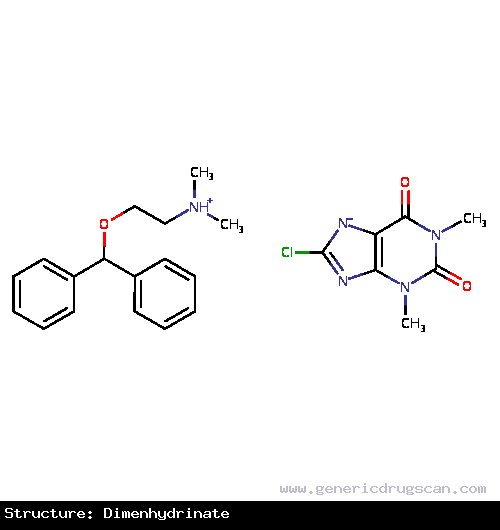Dimenhydrinate Drug: Indication, Dosage, Precaution, Side Effect , Storage, Category Type and corresponding Brands - www.genericdrugscan.com
Dimenhydrinate
Drug Status in USA : ApprovedDrug Status in Canada : Approved
pronunciation
pronounced as (dye men hye' dri nate)
Why is this medication prescribed?
Dimenhydrinate is used to prevent and treat nausea, vomiting, and dizziness caused by motion sickness. Dimenhydrinate is in a class of medications called antihistamines. It works by preventing problems with body balance.
How should this medicine be used?
Dimenhydrinate comes as a tablet and chewable tablet to take by mouth with or without food. To prevent motion sickness, the first dose should be taken 30 minutes to 1 hour before you travel or begin motion activity. Adults and children older than age 12 may usually take dimenhydrinate every 4 to 6 hours as needed to prevent or treat motion sickness. Children under age 12 may usually be given dimenhydrinate every 6 to 8 hours as needed to prevent or treat motion sickness. Follow the directions on the package carefully, and ask your doctor or pharmacist to explain any part you do not understand. Take dimenhydrinate exactly as directed. Do not take more or less of it or take it more often than directed by the package label.
Do not give dimenhydrinate to children younger than 2 years of age unless your doctor has told you to do so.
What are the precautions to be followed?
Before taking dimenhydrinate,- talk with your doctor and pharmacist if you are allergic to dimenhydrinate or any other medications. If you are taking dimenhydrinate chewable tablets, talk to your doctor if you are allergic to tartrazine (FD&C Yellow No. 5, a color additive) or aspirin.
- talk with your doctor and pharmacist about what prescription and nonprescription medications, vitamins, nutritional supplements, and herbal products you are taking or plan to take. Be sure to mention any of the following: aminoglycoside antibiotics such as such as amikacin (Amikin), gentamicin (Garamycin), kanamycin (Kantrex), neomycin (Neo-Rx, Neo-Fradin), netilmicin (Netromycin), paromomycin (Humatin), streptomycin, and tobramycin (Tobi, Nebcin); antidepressants such as amitriptyline (Elavil), amoxapine (Asendin), clomipramine (Anafranil), desipramine (Norpramin), doxepin (Adapin, Sinequan), imipramine (Tofranil), nortriptyline (Aventyl, Pamelor), protriptyline (Vivactil), and trimipramine (Surmontil); antihistamines, such as diphenhydramine; cough and cold medications; ipratropium (Atrovent); medications for anxiety, irritable bowel disease, mental illness, Parkinson's disease, seizures, ulcers, or urinary problems; narcotic or strong pain relievers or muscle relaxants; sedatives; sleeping pills; and tranquilizers. Your doctor may need to change the doses of your medications or monitor you carefully for side effects.
- talk with your doctor if you have or have ever had asthma; shortness of breath or difficulty breathing, including chronic bronchitis (swelling of the air passages that lead to the lungs) or emphysema (damage to air sacs in the lungs); difficulty urinating due to enlargement of the prostate (male reproductive organ); glaucoma (an eye disease that can cause vision loss); or seizures.
- talk with your doctor if you are pregnant, plan to become pregnant, or are breast-feeding. If you become pregnant while taking dimenhydrinate, call your doctor.
- if you are having surgery, including dental surgery, tell the doctor or dentist that you are taking dimenhydrinate.
- you should know that dimenhydrinate may make you drowsy. Do not drive a car, operate machinery, or participate in potentially dangerous activities until you know how this medication affects you.
- avoid alcoholic beverages or products containing alcohol while taking dimenhydrinate. Alcohol can make the side effects from dimenhydrinate worse.
- if you have phenylketonuria (PKU, an inherited condition in which a special diet must be followed to prevent mental retardation), read the package label carefully before taking dimenhydrinate. Dimenhydrinate chewable tablets contain aspartame that forms phenylalanine.
What are possible side effects of this medication ?
Dimenhydrinate may cause side effects. Talk to your doctor if any of these symptoms are severe or do not go away:- drowsiness
- excitement or hyperactivity (especially in children)
- headache
- new or worsening dizziness
- blurred vision
- ringing in the ears
- dry mouth, nose, or throat
- problems with coordination
- fainting
- dizziness
- nausea
- fast, pounding, or irregular heartbeat
Dimenhydrinate may cause other side effects. Call your doctor if you have any unusual problems while taking this medication.
How to store the medication and dispose it of after its use later?
Keep this medication in the container it came in, tightly closed, and out of reach of children. Store it at room temperature and away from excess heat and moisture (not in the bathroom). Throw away any medication that is outdated or no longer needed. Talk to your pharmacist about the proper disposal of your medication.
Drug Category/Class
- Antiemetics
- Histamine H1 Antagonists
| Prescribed | Used for treating vertigo, motion sickness, and nausea associated with pregnancy. |
| Weight : | 469.964 |
| Structure | Dimenhydrinate |
 | |
| Formula | C24H28ClN5O3 |
Dimenhydrinate has 9 Brands listed
| Dramamine (30 ml) | Dramamine (50 mg) |
| Dramamine Inj (50 mg) | Draminate (30 ml) |
| Draminate (50 mg) | Dramnate (50 mg) |
| Dramnate Inj (50 mg) | Gravol (50 mg) |
| Transmine (50 mg) |
Search Generic Drugs alphabetically
